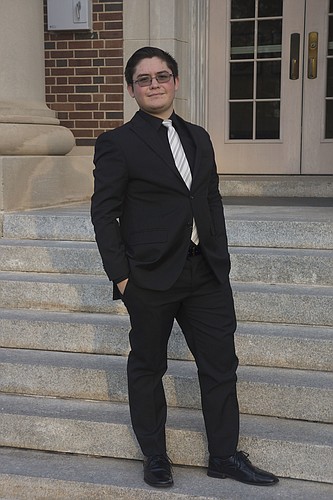- April 25, 2024
-
-
Loading

Loading

Name: Wilson Pava
Age: 23
Family: I live with my parents and my younger brother
Bio: I was originally born in Bogota, Colombia, but I consider myself a Sarasotan. I first came to Sarasota when I was 6 years old. I am a proud product of Sarasota County public schools. I went to Gulf Gate Elementary, Sarasota Middle and Riverview High. Every step along the way I had teachers and mentors who pushed my to be active in the community. I worked with the RHS CoExistence Club to guide tours at Embracing Our Differences. I also participated in Teen Court during my high school career. Through both I was given the chance to experience my first taste of public service. After graduating from RHS in 2015 I began my B.A. in political science at Davidson College in North Carolina. After earning my degree, I came back to Sarasota and began working as a substitute teacher. I was blessed to arrive back with open arms and find myself back home at RHS and Sarasota schools writ large as a substitute.
Why do you want to serve on the Charter Review Board?
I want to serve a little out of spite but mostly out of a desire to see checks and balances in Sarasota County government. I initially got in this race because County Commissioner Nancy Detert showed me a level of disrespect and flippant dismissal that shocked me — she was worse than the worst student I’ve had to deal with in the classroom. I got in this to spite her, to show her a young Latino Sarasotan could not only participate in public discourse but also that I actually could take a leading role in it. Having studied political theory in college and the importance of institutional organization in the running of government, I became more and more convinced that CRB is where I was meant to be. My background, my education and my drive have come together to make me a uniquely dedicated CRB candidate.
If elected, what will be your top three priorities during your term?
Where do you stand: Should the Charter Review Board be proactive initiating changes to charter, or should the board make recommendations based on voter desires and ideas brought to the board?
Like with everything in government, balance is key. You can’t veer too far into being proactive, or else the charter becomes a document of pure policy, subject to changing political tides and sentiments. You also can’t veer too far into being reactive, or else the charter becomes stale and incapable of responding to citizens when it needs to. Right now, we’re too far into the reactivity side of this balancing act. We have a CRB too inactive, too beholden to developer interests, frankly too reluctant to flex the muscles it was given when it was created. As things stand, we need CRB members who are willing to flex those muscles and exert that power proactively — in such a way that enables and facilitates citizen-driven initiatives that will allow us to take a more balanced and citizen-driven stance going forward. You can’t have a CRB that listens to voters that also makes it harder for voters to have any influence.
What is your position on turning the Charter Review Board into an appointed position rather than an elected office?
The issue with the Charter Review Board is not institutional. The problem isn’t that it’s elected. The problem is that weak-willed and developer-beholden politicians make up the board. Heck, the only exception is the one developer on the board. Due to a prolonged effort to discourage citizen input and involvement, the CRB might as well be appointed right now. If anything, restating our belief in an elected Charter Review Board is what is needed.
The CRB has been discussing changes to the charter amendment process. What’s your position on that?
I trust a high schooler to turn work in on time more than I trust the Charter Review Board (as currently composed) with changing the amendment process. We need better board members, people who have been committed to true citizen-first reforms, to lead the charge in brining the people back to the government for the people. I’m hopeful that good will come out of this, but I’m also hopeful that I’ll win the lottery. Sarasotans deserve more than a distant hope of competency.
What are your comments about reforming the CRB, so it mirrors the State Constitutional Revision Commission — appointed members every 10 or 20 years to review the charter, rather than the existing system of elected members who serve four-year terms?
The American Constitution is amended as needed. The Florida Constitution is revised every 10 or 20 years. As government becomes more local, it has a stronger influence on everyone’s day-to-day lives. Our constitutions should reflect that: If the federal government has the weakest influence, and the Florida government a bit more, and the Sarasota government even more, then we should amend our charter — i.e., our constitution — more frequently.
There are great benefits to the way in which we have instituted our federal government and our state government. Some of those benefits can also be true at the local level. Increasing flexibility in constitutions as government becomes local is one example. Checks and balances on the power of entities (Congress, the governor, the County Commission) is yet another example. We’re lacking in both right now, the place where we can begin to change that is the Charter Review Board.